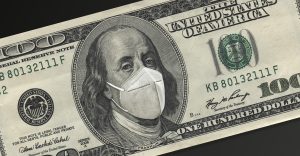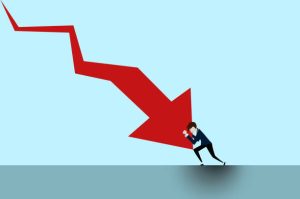20
Ethan May
Introduction

Not only has Covid-19 affected our mental and physical health, but it has affected the health of our economy. Before Covid the United States had a booming economy. Unemployment was at a low of 3.5%, much lower than the federal reserve’s expectation of 4.8% (Unemployment rose higher in three months of COVID-19 than it did in two years of the Great Recession 2020). GDP growth rate was at 2.5%, median household incomes were high, and manufacturing employment jobs were doing very well (2020).This all changed with the impact of Covid-19 which caused the economy to face a major downturn. Due to restrictions put into place on everyday activities consumer spending decreased and businesses were forced to make major cutbacks (Jones 2020). The impact of Covid-19 on the U.S. economy and market is immense, it not only created a recession in market trends, but caused one of the largest spikes in unemployment America has ever seen.
Connection to STS Theory
Privileged positions of business and science is a theory describing the authority that persons in the areas of business and science have in economic, political, and technosocial affairs. Businesses have strong decision-making abilities in the function of society, and choose what technological innovations to develop. This relates to the topic because it is those businesses that will need to make decisions and carry out procedures to help us out of a recession, ultimately bringing back unemployment to its steady state level. This is due to the fact that businesses and companies control the economy.
Market Recessions

Restrictions put into place from the government to halt the spread of corona caused economic inactivity. This resulted in a decrease in Consumer spending and ultimately resulting in a decrease in GDP and putting the U.S. into a recession. Advanced economies, such as America, shrank 7 percent (Luniya 2020). That weakness will spill over to the outlook for emerging market and developing economies, who contracted by 2.5 percent as they cope with their own domestic outbreaks of the virus (2020). Interest rates in the USA have turned nearly 0%, which was done to give a slight boost to the market This meant the interest earned by depositors is nearly zero, which means very few people are interested in investing in banks in the USA (Luniya 2020). Due to these economic downturns and recessions businesses need to cut back on production and employment, leading to an increase in unemployment.
Unemployment
Unemployment increased from 3.8% in February to 13% in May. Additionally, in the month of May, women had an unemployment rate of 14.3% while men’s was 11.9% (Unemployment rose higher in three months of COVID-19 than it did in two years of the Great Recession 2020). This is due to the fact that women hold the majority of the jobs in the leisure and hospitality sector (-35% employment) and the educational sector (-15% employment), which were affected the most by corona. Unemployment reached a high of over 15%, unemployment rates for specific races and genders are as follows.
| Race | Men | Women |
| White | 9.7% | 11.9% |
| Black | 15.8% | 17.3% |
| Asian | 13.3% | 16.7% |
| Hispanic | 15.5% | 19.5% |
(Alba 2020). Age was not a substantial contributor to unemployment rates. However, young adults were more concerned because of their personal economic situation, potentially due to their higher unemployment risk.
How to Cope With Effects
“The forecast assumes that the pandemic recedes in such a way that domestic mitigation measures can be lifted by mid-year in advanced economies and later in developing countries, that adverse global spillovers ease during the second half of 2020, and that widespread financial crises are avoided. The immediate priority for policymakers is to address the health crisis and contain the short-term economic damage” (The Global Economic Outlook During the COVID-19 Pandemic: A Changed World 2020). Over the longer term, authorities such as privileged business, need to undertake comprehensive reform programs to improve the drivers of economic growth once the crisis lifts. Strengthening health care, ensuring economic activity in firms, supporting the private sector, and getting money directly to people will all help with these comprehensive reform programs. Manufacturing sectors will need to start boosting production, traders need to be bearish, and investors need to invest in bulk at these low prices (2020).
A Year Later: Where The US Economy Stands
The COVID-19 pandemic affected many aspects of the US economy: small business, unemployment rates, mortgage rates, the stock market, etc. The Fed cut back on the interest rates over the year, which has benefitted homeowners and buyers tremendously. For reference, mortgage rates were as high as 4.38% roughly a year before the pandemic occurred and as low as 2.67% during the summer after the pandemic was declared.
The job market took a scary turn once the pandemic was declared, however a year later it is steadily improving. Prior to the pandemic, the unemployment rate according to the U-6 rate was about 7%. As the pandemic progressed the nation saw that rate rise to 22.9%, which was extremely concerning. Now a year later the unemployment rate is declining and was last reported to be 11.8%.
The nation’s wealthiest people actually saw an increase in their net worth. Before the pandemic was declared the net worth of America’s 100 richest people was roughly $2 trillion. That group of people actually saw their collective net worth rise to $2.7 trillion.
Over the past year the stock market was also affected tremendously. In the early stages of the pandemic, the nation watched as the stock market suddenly crashed. The following months showed extreme volatility that was heading in the positive direction. Currently, stocks have gained roughly 80% since the lows seen in March of 2020 and the market seems to be in position to continue this upward trend. Also, over the pandemic another factor has come to play in the stock market. A new cohort of retail investors using no-fee online trading platforms have changed the way that investing is done. These new trading platforms have opened the door for anyone to start investing without having to go through a brokerage and pay a commission. This influx of household investors is one of the main reasons why the market is seeing increased volatility.
Clemson’s Response: CARES Act
The Coronavirus Aid, Relies and Economic Security (CARES) Act was passed by Congress to provide economic aid to a variety of people, some of which included college students. Of the money Clemson University received, they vowed to allocate no less than fifty percent to emergency grants for students (“CARES Act,” n.d.). Beginning May 5, 2020, over six million dollars distributed amongst Clemson’s 9,159 most economically vulnerable students (“CARES Act,” n.d.).
References
About the CARES Act and the Consolidated Appropriations Act. (n.d.). Retrieved April 18, 2021, from https://home.treasury.gov/policy-issues/coronavirus/about-the-cares-act
Handwerker, E. W., Sveikauskas, L., Schultz, M., Piacentini, J., & Meyer, P. B. (2020, December). Employment Recovery in The Wake of The COVID-19 Pandemic. Retrieved April 22, 2021, from https://www.bls.gov/opub/mlr/2020/article/employment-recovery.htm
Alba, Stephanie Aaronson and Francisca. “The Unemployment Impacts of COVID-19: Lesson. the Great Recession.” Brookings, 15 Apr. 2020, www.brookings.edu/blog/up-front/2020/04/15/the-unemployment-impacts-of-covid-19-lessons-from-the-great-recession/.
CARES Act. (n.d.). Retrieved April 18, 2021, from https://www.clemson.edu/covid-19/return-to-campus/learning-on-campus.html#cares-act
Jones, L., & Brown, D. (2020, June 30). Coronavirus: A visual guide to the economic impact. Retrieved October 10, 2020, from https://www.bbc.com/news/business-51706225
Luniya, M. Impact of Corona Virus on the Economy. (2020, March 20). Retrieved October 10, 2020, from https://advance-lexis-com.libproxy.clemson.edu/document/?pdmfid=1516831
The Global Economic Outlook During the COVID-19 Pandemic: A Changed World. (2020, June 8). Retrieved October 10, 2020, from https://www.worldbank.org/en/news/feature/2020/06/08/the-global-economic-outlook-during-the-covid-19-pandemic-a-changed-world.
Unemployment rose higher in three months of COVID-19 than it did in two years of the Great Recession. (2020). Retrieved 22 October 2020, from https://www.pewresearch.org/fact-tank/2020/06/11/unemployment-rose-higher-in-three-months-of-covid-19-than-it-did-in-two-years-of-the-great-recession/
Giammona, Craig, et al. “A Year Later, US Is Still Charting the Long Way Back to Normal .” Bloomberg.com, Bloomberg, 12 Mar. 2021, www.bloomberg.com/graphics/2021-covid-economy-one-year-later/.
Images
“Covid-19-coronavirus-economy” by TayebMEZAHDIA is in the Public Domain
“Recession” by mikroman6 is licensed under CC BY-NC 4.0

